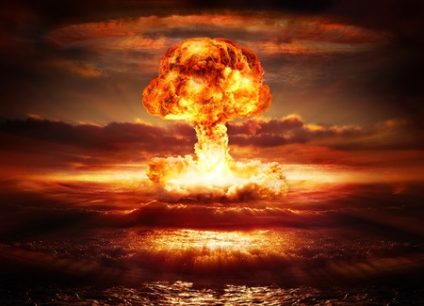
Imagine a natural disaster: flood, fire, hurricane, blizzard. Or, if you prefer, imagine a manmade disaster: a terrorist attack, a power grid failure, a nuclear explosion deliberate or accidental. Imagine the death, injury, destruction, fear and misery.
What would be your first priority if you were caring for those people? It wouldn’t be promoting breastfeeding, unless you were mad as a March hare — or a UK lactivist.
[pullquote align=”right” cite=”” link=”” color=”” class=”” size=””]Disaster planning for lactivists: prevent formula donations.[/pullquote]
Breastfeeding Trends UK just released a position paper entitled Protecting Babies in Emergencies. The ugly truth, however, is it is NOT about protecting babies; it’s about protecting breastfeeding.
UK lactivists are forever bemoaning the “dismal” state of breastfeeding in the UK, as if that has anything to do with infant health. As they never tire of telling us, less than 0.5% of UK babies are breastfed to a year of age. Nonetheless, the UK infant mortality rate is 3.6/1000, the lowest ever for the UK and among the lowest in the world.
Since — as they never stop lamenting — the UK breastfeeding rate is very low, you might think that a document that focused on protecting babies in the event of a disaster would focus on making sure that there is an adequate supply of formula and clean water with which to prepare it. You would be wrong. In a 1250 word document, only two sentences are devoted the vast majority of babies who might be affected:
Babies who are fully or partially formula fed are at risk if their caregivers lose access to clean water, are unable to sterilise feeding equipment or suffer disruption or contamination of their formula milk supplies. A suitable environment for preparation and storage of feeds, sterilising equipment, boiling water and safe storage such as a refrigerator, are all needed to prevent bacterial contamination.
The bulk of the position paper — I’m not making this up — is devoted to preventing worldwide donations of formula!
In the absence of guidance, agencies responsible for co-ordinating emergency response and volunteers working on the front line are often not aware that donations of formula milk can put babies at risk. Risks from donated formula milk include inadvertently distributing products that are unsuitable for babies under six months or for babies with special nutritional needs, as well as distributing milk that is contaminated or out-of-date.
Because in the wake of a nuclear holocaust when babies are dying in droves the last thing we should countenance is using formula after the sell by date.
What do these lactivists fools imagine will happen if there are no formula donations? Potentially tens of thousands of babies might die but apparently they’re expendable because they’re formula fed.
Lactivists, as always, are only concerned with promoting breastfeeding, not saving lives. They’re honest about their real anxiety:
There is also a risk that donations will be inappropriately provided to parents of breastfed babies, which can undermine the protective effect of breastfeeding and cause parents to become dependent on a continued supply of formula milk.
Sure, when formula fed babies are dying from lack of formula, and their mothers are rioting for lack of formula, aid workers will be spending their time searching for the tiny minority of breastfeeding women so they can tempt them away from breastfeeding with free formula. UK lactivists have officially lost their minds.
And what do these geniuses propose to do for breastfed babies whose mothers die during the natural disaster. Evidently it never occurs to them that a lactating mother can be injured or killed, cutting off her infant’s supply of food. Maybe they think “magical” benefits extend to preventing deaths of breastfeeding mothers. Or maybe they think once a breastfed baby is no longer breastfeeding, they’re expendable, too.
Their “guidance” in the event of a disaster is not focused on saving babies; it’s focused on saving breastfeeding … and employing lactation consultants:
…If breastfeeding helpers are not pre-authorised as part of planned disaster response the immediate help that families need can be delayed.
It gets worse:
- …Local emergency planning should have identified appropriate infant feeding support from local health and voluntary services. There are telephone helplines which support caregivers with all aspects of infant feeding:NCT helpline (0300 330 0700)
The Breastfeeding Helpline (0300 100 0212).- DO encourage donations of money to recognised agencies so that parents, caregivers and agencies can buy any formula or supplies needed, rather than donations of formula products…
- DO ensure that formula milk is purchased and distributed only for babies who need formula milk, following basic screening of families …
- DO NOT distribute formula milk in an untargeted way.
Do these women even hear themselves?
Basic human ethics demands that we try to save the majority of babies LIVES. In a country where very few women breastfeed that means maintaining a large and ongoing supply of formula and clean water to prepare it. Whatever way that can be accomplished most effectively in the wake of a disaster — and formula donations may be an effective way of accomplishing it — should be undertaken.
Anyone who stands in the way of making sure that as many babies as possible are fed, regardless of how they are fed, is deluded at best and monstrously self absorbed at worst.
Because the incontrovertible truth, especially during a disaster, is Fed Is Best!

